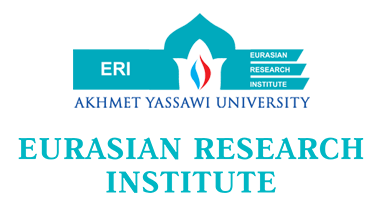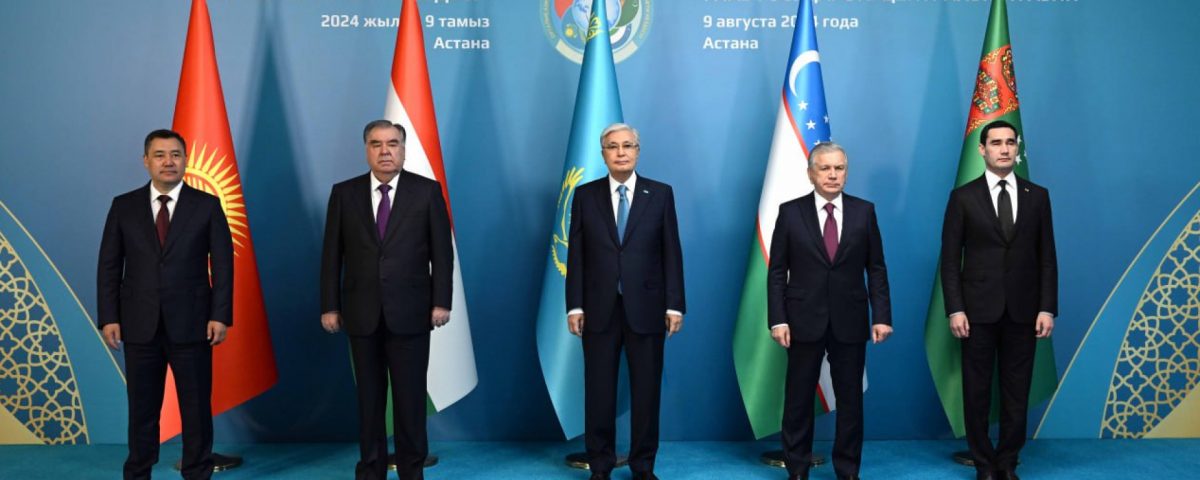The 6th Consultative Meeting of the Heads of Central Asian States took place in Astana on 9 August 2024. President Sadyr Japarov of Kyrgyzstan, President Emomali Rahmon of Tajikistan, President Serdar Berdimuhamedov of Turkmenistan, and President Shavkat Mirziyoyev of Uzbekistan attended the event under the chairmanship of Kassym-Jomart Tokayev, the President of Kazakhstan. Ilham Aliyev, President of Azerbaijan, and Kakha Imnadze, the Head of the UN Regional Centre for Preventive Diplomacy for Central Asian Countries joined the expanded format as guests of honor.
Following summits in Tashkent, Turkmenbashi, Cholpon-Ata, and Dushanbe, the meeting marked the sixth gathering of the heads of Central Asian states since its inception in Astana in 2018. The leaders’ annual meetings have become a platform for discussing regional cooperation and facilitating effective collaboration and integration.
During the summit, the concept of development of regional cooperation “Central Asia – 2040” was signed as presenting a ‘conceptual meaning for the region’. The concept’s primary goal is to achieve a regional rapprochement by expanding the five-way interaction and improving the region’s international subjectivity (Kapital, 2024). It aims to initiate a fresh phase in regional cooperation, highlighting peace and stability as crucial prerequisites for sustained development. It also concentrates on enhancing economic and logistical capabilities, establishing shared strategies to guarantee water, energy, and food security, elevating the young intellectual generation as the region’s asset, and establishing a civilizational identity through the unification of cultural and humanitarian bonds among fraternal nations (KazPravda, 2024).
President Tokayev initiated the concept and published its outlines in the article “The Renaissance of Central Asia: Toward Sustainable Development and Prosperity.” He assumed that it is essential to strengthen regional cooperation as well as preserve and protect the region’s spiritual and cultural code in the current context of geopolitical uncertainty (KazPravda, 2024). During the summit, the attending leaders emphasized the importance of enhancing regional cooperation. President Shavkat Mirziyoyev expressed confidence in the emergence of a common regional identity. President Sadyr Japarov believes that the processes of rapprochement acquired a stable and consistent character, whereas President Emomali Rahmon displayed his satisfaction with the development of regional cooperation. Meanwhile, Turkmen President Serdar Berdimuhamedov emphasized that summit meetings ought to maintain a consultative format, serving as a platform for political dialogue without rigid rules, procedures, and any additional add-ons. According to him, the heads of state of Central Asian states should remain the core of the summit, essential for maintaining the regional five-party political dialogue (President.uz, 2024; 24.kg, 2024a; MFA TJ, 2024; MFA.gov.tm, 2024).
Given that a strong economic basis lays the groundwork for meaningful collaboration, the leaders emphasized the significance of intra-regional trade, which over the past five years has increased by over 80% and exceeded US$11 billion with a potential to reach up to $15 billion (Akorda, 2024). In this regard, President Mirziyoyev proposed considering the creation of a single regional market as a long-term strategic goal. He suggested launching an Economic Council—regular meetings at the level of Deputy Prime Ministers of Central Asian countries—as a step towards that. Next year, Tashkent is ready to host the inaugural meeting, and concurrently, the Central Asian Business Partnership Week could be organized, featuring industry conferences, an industrial potential exhibition fair, and export opportunity presentations (President.uz, 2024). President Rahmon supported the idea of holding the annual exhibition “Expo Central Asia” within the framework of consultative meetings (MFA TJ, 2024). President Tokayev welcomed the proposal to establish the Business Council of Central Asian countries (Akorda, 2024).
All Central Asian states’ presidents emphasized the region’s connectivity potential, which is one of the concept’s key areas of cooperation. President Mirziyoyev mentioned that due to the geographical challenges, the share of costs for transporting foreign trade cargo reaches 50% of the final cost of goods, which is four to five times higher than the world average. Therefore, it is crucial to collaborate in the fields of transportation and transit (President.uz, 2024). The implementation of joint infrastructure and transport initiatives will lead to new growth points for the economies, especially in the present race for connectivity. In this regard, President Sadyr Japarov welcomed the Kyrgyz side’s initiative to adopt the Agreement on Transport and Transit. To put its provisions into action, he suggested organizing an expert conference with transport ministries, carriers, freight forwarders, logistics companies, and specialists (24.kg, 2024). In general, presidents emphasized the projects within the Trans-Caspian International Transport Route, the North-South Corridor, and the Belt and Road Initiative. As part of the summit, parties adopted the Comprehensive Strategy for the Development of the Central Asian Transport System.
In terms of industrial cooperation, President Tokayev exemplified joint projects, such as the Kambarata HPP-1 in Kyrgyzstan, the Rogun HPP in Tajikistan, and gas initiatives in Central Asia, which are successful examples of large-scale joint infrastructure and transport projects that can stimulate economic growth. President Mirziyoyev proposed mutual support and stimulation of industrial cooperation. He proposed developing a unified map of the region’s industrialization by creating short value chains and attracting investments and technologies (Akorda, 2024; President.uz, 2024).
As for regional security, President Mirziyoyev stated that the international agenda has pushed the situation in neighboring Afghanistan to the background. To address this and other regional issues, the concept for ensuring regional security and stability needs to be developed. When considering Afghanistan, President Berdimuhamedov believes that the needs of the Afghan people should take precedence. The Central Asian region should develop a common positive, constructive, and realistic line concerning the current Afghan administration (President.uz, 2024; MFA.gov.tm, 2024).
Energy and water issues were also highlighted among the priority issues of the region. The president of Turkmenistan asserts that the Central Asian states should maintain their growing energy needs while ensuring efficient and careful use of natural resources. In this regard, the President of Kyrgyzstan has initiated the creation of a regional hub in Bishkek to implement energy-efficient and resource-saving technologies. The President of Kazakhstan stated that it is necessary to develop a new consolidated water policy to ensure equal and fair water use and mutual obligations.
Education, science, culture, and human capital development are also among the key areas for enhancing regional cooperation, as Kassym-Jomart Tokayev highlighted. The advancement of Central Asian higher education space is an essential mechanism for deepening regional people-to-people engagement. In this direction, Uzbekistan is going to hold the First Educational Forum of Central Asia in October 2024 in Tashkent, while President Mirziyoyev proposed holding the next meeting of the Central Asian Expert Forum of leading analytical centers and research institutes in Uzbekistan. He also emphasized that the adoption of the Central Asian Program of Educational and Academic Exchanges, as well as an Agreement on Mutual Recognition of Diplomas of Leading Universities in Central Asian Countries, could facilitate educational exchange and integration.
The summit also discussed potential integration projects in areas like tourism. In this regard, President Mirziyoyev proposed the introduction of mass tourism products based on the principle of “one tour—the entire region,” as well as mutual recognition of national ID cards.
The identified focus areas by the summit leaders, in addition to the concept, led to the signing of a roadmap on developing regional cooperation for 2025-2027 and an action plan for developing industrial cooperation among the Central Asian countries for 2025-2027. Furthermore, representatives of the official delegations executed a Memorandum of Understanding on the development of transport and logistics centers in the Central Asian States; a Communique on the results of the first meeting of the Ministers of Energy of Central Asia; and an Astana Communique of the second meeting of the Ministers of Transport of the Central Asian States. A Council of Ministers of Foreign Affairs was also established at the summit.
However, the summit did not achieve all the desired outcomes. Specifically, the aspirations of Kazakhstani diplomats to reach a consensus on the signing of the Treaty on Friendship, Good-Neighborliness, and Cooperation for the Development of Central Asia in the XXI century by Tajikistan and Turkmenistan have not yielded any results (TASS, 2024). Kazakhstan, Kyrgyzstan, and Uzbekistan signed the treaty for an indefinite period during the 4th Consultative Meeting of the Central Asian Heads of States in 2022, but Tajikistan and Turkmenistan still abstained from signing it due to their internal contradictions (nCa, 2022). President Rahmon noted that previous consultative meetings had received over one hundred proposals and initiatives, which are under consideration and have promising potential if implemented.
Overall, the summit reaffirmed the strengthening of Central Asian regional ties and regional unity aspirations. Common cultural and traditional bonds, along with a special Central Asian mentality were emphasized by all leaders. The prevalence of references to Central Asian identity indicates its topicality. The participation of the Azerbaijan President, who also stressed the fraternal ties and developing cooperation between countries, indicates that Azerbaijan, in virtue of its Turkic roots, associates itself with the Central Asian region.
The growing regional coherence is vivid in public space. Examples of supporting neighboring nations on the world stage have become more common. The recent instance of the Uzbek coach helping the Kyrgyz boxer at the Paris Olympics serves as a prime illustration of this phenomenon (24.kg, 2024). Other spheres, whether it is cultural, academic, or educational, demonstrate a growing unity and interest in strengthening regional ties. To sum up, while economic, trade, logistics, and other practical collaborations establish a solid foundation for intra-region connections, the shared historical, cultural, and traditional bonds serve as a robust basis for fostering people-to-people interactions. Political dialogue between Central Asian nations facilitates real interaction and engagement.
References:
Akorda (2024). The VI Consultative meeting of the Heads of State of Central Asia was held under the chairmanship of Kassym-Jomart Tokayev. Retrieved from https://www.akorda.kz/ru/pod-predsedatelstvom-kasym-zhomarta-tokaeva-sostoyalas-vi-konsultativnaya-vstrecha-glav-gosudarstv-centralnoy-azii-971327. Accessed on 16.09.2024.
Kapital (2024). Kazakhstan has developed a strategy for the development of Central Asia – 2040. Retrieved from https://kapital.kz/economic/125820/kazakhstan-razrabotal-strategiyu-razvitiya-tsentral-naya-aziya-2040.html. Accessed on 16.09.2024.
KazPravda (2024). Central Asian Renaissance: Towards Sustainable Development and Prosperity. Retrieved from https://kazpravda.kz/n/renessans-tsentralnoy-azii-na-puti-k-ustoychivomu-razvitiyu-i-protsvetaniyu/. Accessed on 16.09.2024.
Ministry of Foreign Affairs of Tajikistan (2024). Participation in the Sixth Consultative Meeting of the Heads of State of Central Asia. Retrieved from https://mfa.tj/ru/nur-sultan/view/15500/uchastie-v-shestoi-konsultativnoi-vstreche-glav-gosudarstv-tsentralnoi-azii. Accessed on 16.09.2024.
Ministry of Foreign Affairs of Turkmenistan (2024). Speech by the President of Turkmenistan Serdar Berdimuhamedov at the Sixth Consultative Meeting of the Heads of State of Central Asia. Retrieved from https://www.mfa.gov.tm/ru/articles/1310. Accessed on 16.09.2024.
nCa (2022). Treaty on Friendship, Good-Neighborliness and Cooperation for the Development of Central Asia in the XXI Century – Key points. Retrieved from https://www.newscentralasia.net/2022/07/26/treaty-on-friendship-good-neighborliness-and-cooperation-for-the-development-of-central-asia-in-the-xxi-century-key-points/. Accessed on 16.09.2024.
President.az (2024). Ilham Aliyev spoke at the Meeting of the Heads of State of Central Asia and the Republic of Azerbaijan in Astana. Retrieved from https://president.az/ru/articles/view/66644. Accessed on 16.09.2024.
President.uz (2024). Speech by the President of the Republic of Uzbekistan Shavkat Mirziyoyev at the Consultative Meeting of the Heads of State of Central Asia. Retrieved from https://president.uz/ru/lists/view/7456. Accessed on 16.09.2024.
TASS (2024). Kazakhstan hopes that all countries in the region will sign the treaty of friendship in Central Asia. Retrieved from https://tass.ru/ekonomika/20917785. Accessed on 16.09.2024.
24.kg (2024). Sadyr Japarov spoke at the Consultative Meeting of the Heads of State of Central Asia. Retrieved from https://24.kg/vlast/301639_sadyir_japarov_vyistupil_nakonsultativnoy_vstreche_glav_gosudarstvtsa_/. Accessed on 16.09.2024.
24.kg (2024). Uzbek coach awarded a medal for assistance to Kyrgyz boxer Munarbek Seyitbek uulu. Retrieved from https://24.kg/english/301362_Uzbek_coach_awarded_medal_for_assistance_to_Kyrgyz_boxer_Munarbek_Seyitbek_uulu_/. Accessed on 16.09.2024.
Note: The views expressed in this blog are the author’s own and do not necessarily reflect the Institute’s editorial policy.

